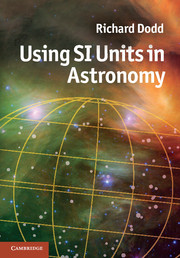Book contents
- Frontmatter
- Contents
- Preface
- Acknowledgements
- 1 Introduction
- 2 An introduction to SI units
- 3 Dimensional analysis
- 4 Unit of angular measure (radian)
- 5 Unit of time (second)
- 6 Unit of length (metre)
- 7 Unit of mass (kilogram)
- 8 Unit of luminous intensity (candela)
- 9 Unit of thermodynamic temperature (kelvin)
- 10 Unit of electric current (ampere)
- 11 Unit of amount of substance (mole)
- 12 Astronomical taxonomy
- References
- Index
12 - Astronomical taxonomy
Published online by Cambridge University Press: 05 December 2011
- Frontmatter
- Contents
- Preface
- Acknowledgements
- 1 Introduction
- 2 An introduction to SI units
- 3 Dimensional analysis
- 4 Unit of angular measure (radian)
- 5 Unit of time (second)
- 6 Unit of length (metre)
- 7 Unit of mass (kilogram)
- 8 Unit of luminous intensity (candela)
- 9 Unit of thermodynamic temperature (kelvin)
- 10 Unit of electric current (ampere)
- 11 Unit of amount of substance (mole)
- 12 Astronomical taxonomy
- References
- Index
Summary
Definition of taxonomy
Taxonomy is defined as the science of classification and is derived from the ancient Greek word, ταξις, meaning arrangement, order, regularity (Liddell & Scott, 1996).
Classification in astronomy
Funk & Wagnalls New Standard Dictionary of the English Language (1946) defines classification as:
The act or process of arranging by classes; a grouping into classes; the putting together of like objects or facts under a common designation; a process based on similarities of nature, attributes, or relations. Classification may proceed by the gathering together of similar things into a class, or by the unfolding of general groups into narrower or more specific divisions.
To classify, therefore, is to arrange in a class or classes on the basis of observed resemblances and differences. For this to proceed, two pieces of information are needed: an identity (the name of that which is to be classified) and an attribute (does the identified object have or could it have the necessary information for it to be classified as having the attribute), e.g., does Sirius (the identity – the name of the star) have a spectral type (the attribute or classification)? The answer is yes and the spectral type of Sirius is A1. It should be noted that the group of identifying names or definitions of a class of objects may also constitute a classification, e.g., the recent IAU definitions of types of bodies in the Solar System in which the new class, dwarf planet, contains the objects Pluto, Ceres and Eris.
Information
- Type
- Chapter
- Information
- Using SI Units in Astronomy , pp. 206 - 218Publisher: Cambridge University PressPrint publication year: 2011
